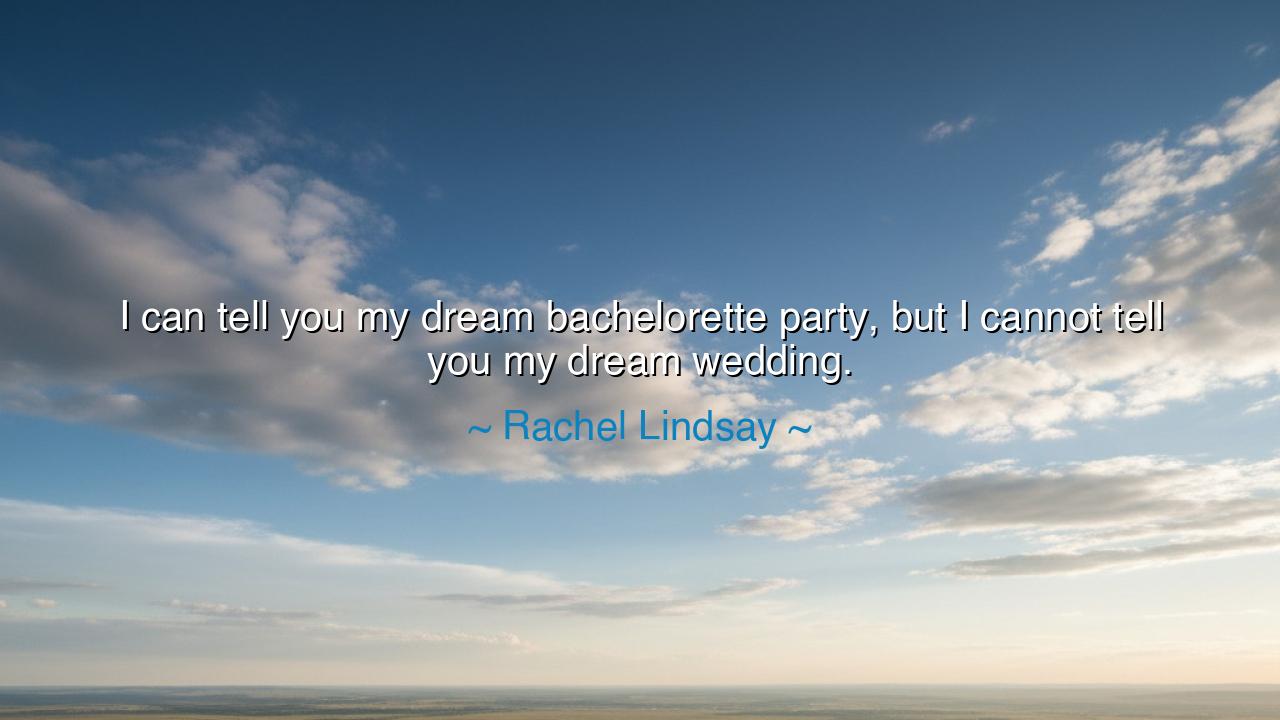
I can tell you my dream bachelorette party, but I cannot tell






Rachel Lindsay, with candor and lightness of spirit, declared: “I can tell you my dream bachelorette party, but I cannot tell you my dream wedding.” In these words she unveils a paradox of desire — that for some, the joy of freedom and laughter with companions shines clearer in the imagination than the solemnity of vows and ritual. The bachelorette party, playful and alive, represents friendship and release, while the wedding, heavy with expectation, often feels less personal, more bound by tradition and duty.
The ancients, too, recognized this tension between festivity and ceremony. In Rome, brides celebrated the Cena Nuptialis, a feast with companions before entering into the sacred covenant of marriage. It was here, in laughter and fellowship, that the heart found its last taste of unburdened joy before duty descended. Lindsay’s vision of her dream bachelorette party, contrasted with her uncertainty about the wedding, echoes this same truth — that the bonds of friendship are often simpler to imagine than the weight of forever.
History offers us the tale of Anne of Cleves, whose wedding to Henry VIII was arranged without her full desire. Though she fulfilled her role as queen, her marriage was quickly annulled, and her true happiness came afterward when she was called the “King’s Beloved Sister.” Her joy was found not in the ceremony of her wedding, but in the freedom and friendships she later enjoyed. Like Lindsay, she shows us that sometimes the heart imagines celebration more vividly than ritual.
Her words also remind us of the burden of expectation. Society tells us that every girl must dream of her gown, her aisle, her perfect day. Yet Lindsay defies this, admitting she has no such dream. Instead, she dreams of the gathering where she is unburdened, surrounded not by obligation but by chosen companions. There is strength and honesty in this — the courage to admit that one’s joy may lie not in tradition but in authenticity.
Let the generations remember: a wedding is but one moment, a passage into union, while the bonds of friendship and laughter also hold sacred power. To dream of one and not the other is no failing, but an expression of the soul’s truth. As Rachel Lindsay teaches, the heart does not always follow the scripts of tradition — it seeks what brings life, joy, and belonging. And sometimes, that vision is clearer in the laughter of friends than in the solemnity of vows.






IIIrisxtyn Irs
I totally understand where Rachel Lindsay is coming from. Bachelorette parties are all about having fun with close friends, but weddings often come with a lot of pressure and expectations, which could make it harder to picture the ‘dream’ wedding. Maybe it’s because weddings are so layered with tradition and societal influences. Do you think the idea of a perfect wedding is more about what’s expected of us than what we truly want?
GDGold D.dragon
It’s intriguing that Rachel Lindsay can envision her ideal bachelorette party but feels uncertain about her dream wedding. Could it be that weddings are so heavily influenced by tradition, expectations, and external pressure that it’s hard to create a vision that truly feels personal and authentic? Do you think the idea of a ‘dream wedding’ is something society has shaped, making it harder for people to define for themselves?
GN19.Truong Gia Nghi
Rachel Lindsay’s quote made me think about how we often dream of things like bachelorette parties, which are fun and carefree, but the pressure of planning a wedding can make it seem more daunting. Maybe the idea of a dream wedding is difficult to define because it carries so much weight. Do you think weddings are overhyped in a way that takes the fun out of imagining them?
PKPham Khoi
I find Rachel Lindsay’s perspective really interesting. It seems like the idea of a bachelorette party is more about having fun and celebrating with friends, while the wedding itself is a much deeper and more personal event. It makes me wonder, do you think society places too much focus on having the ‘perfect’ wedding day, making it hard for people to imagine or express their ideal wedding? Does anyone else feel that way?